 Before launching this site in October 2018, I put a tagline under my name in the masthead. At first, it referred rather boringly to the half-century of retrospective I wanted to set down here. I eventually changed it to “Navigating this dispensation’s last days” and cited a couple of Biblical verses to justify the reference to “dispensation.”
Before launching this site in October 2018, I put a tagline under my name in the masthead. At first, it referred rather boringly to the half-century of retrospective I wanted to set down here. I eventually changed it to “Navigating this dispensation’s last days” and cited a couple of Biblical verses to justify the reference to “dispensation.”
Still boring, perhaps, but at least it suggested the unity of my interests.
My understanding of the current historical phase—the dispensation of the grace of God (Ephesians 3:2)—informs how I evaluate events, arguments, apologetics, liberty and threats thereto, and everything else, and therefore what I write on this blog. Every visitor here should know that. We’re living in this dispensation’s last days with its syndrome of 21 wicked symptoms (2 Timothy 3).
That unity hasn’t always been clear. The hundred-plus posts published so far have struck even me as an aggregate, not an organic whole, a “many” without an obvious “one.” Mixed messaging may have resulted.


For example, if an essay on Brand Blanshard or C. E. M. Joad drew you in, you may have been put off by posts on the metapologetics of Greg Bahnsen (which he learned from Cornelius Van Til).



Or perhaps you appreciated reading about the libertarian Murray Rothbard, but couldn’t care less about Stalinist Herbert Aptheker or Trotskyist George Novack.
(Or vice versa.)
Then there’s my goal, puzzling to some who know me, of producing a life-and-thought study of Otis Q. Sellers, the independent dispensationalist you’ve probably never heard of.

The manuscript is growing, but as I’m challenged to summarize his thought (already clearly expressed, but spread out over many publications and recordings), I’ll be blogging much of the rest of the book into existence. Continue reading ““Helping you navigate this dispensation’s last days”: What do I mean?”


 worldview as the only one that can support rational defense itself—my approach to apologetics (see
worldview as the only one that can support rational defense itself—my approach to apologetics (see  My
My 



 A little over fifty years ago, when my interest in philosophy was budding, I encountered Bertrand Russell’s Why I Am Not a Christian. (My edition was the 1957 Simon & Schuster paperback, the one pictured below).
A little over fifty years ago, when my interest in philosophy was budding, I encountered Bertrand Russell’s Why I Am Not a Christian. (My edition was the 1957 Simon & Schuster paperback, the one pictured below). 


 My internal critique of Smith’s worldview,
My internal critique of Smith’s worldview,  George first published Atheism: The Case Against God in 1974. The book is still in print published by Prometheus. For six years he was a general editor and scriptwriter for the Audio Classics audio tapes by Knowledge Products, currently senior research fellow for the Institute for Human Studies at George Mason University, and again his latest book Atheism, Ayn Rand, and Other Heresies. George Smith, we welcome you to the program.
George first published Atheism: The Case Against God in 1974. The book is still in print published by Prometheus. For six years he was a general editor and scriptwriter for the Audio Classics audio tapes by Knowledge Products, currently senior research fellow for the Institute for Human Studies at George Mason University, and again his latest book Atheism, Ayn Rand, and Other Heresies. George Smith, we welcome you to the program.

 A Catholic Challenge to Modern Atheism is the subtitle of
A Catholic Challenge to Modern Atheism is the subtitle of 

 Bill Vallicella, the
Bill Vallicella, the 
 The new edition Josh McDowell’s
The new edition Josh McDowell’s 

